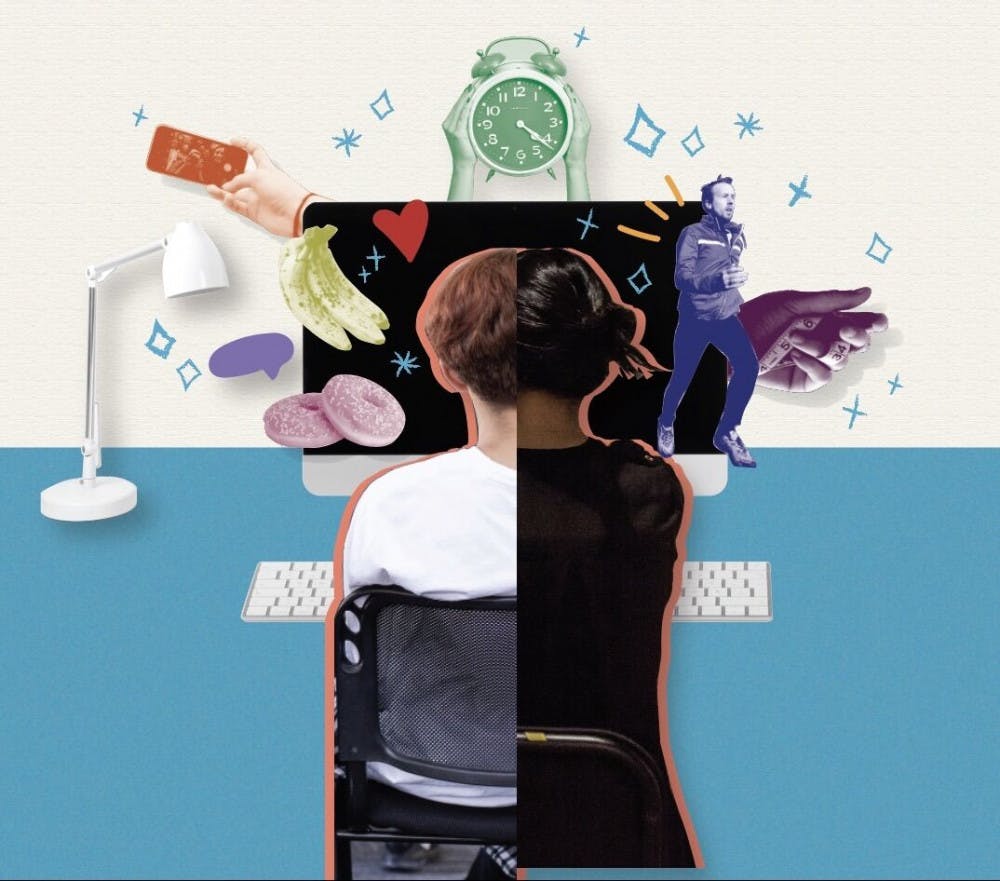Grady Svetly grew tired of being the butt of the joke because of his weight in middle school.
Even though they were just jokes to his peers at the time, they left a lasting impact, as these negative interactions laid the foundation for how he built a relationship with his body, the 18-year-old UF computer science freshman said.
According to researchers from the University of Birmingham, everyday worries about looks can be exacerbated by increased phone usage and less face-to-face interactions during the COVID-19 pandemic. As many students self-isolate and spend hours scrolling through social media, a sense of self-worth can be derived by comparing themselves to others.
With the popularization of the controversial body positivity movement encouraging women to love their bodies no matter their size or build, some men feel they are left out of the narrative.
“Men are left out of the conversation of body positivity because in order for them to participate in the movement, there needs to be vulnerability,” Svetly said. “That isn’t a quality that is considered ‘manly’ to have, meaning that most men don’t open up about their insecurities.”
Research from The Body Project shows that 95% of college-age men are dissatisfied with their bodies on some level. Men are also less likely to seek help for body image issues, holding off longer than women on average due to feelings of shame.
When Karin Kratina of Gainesville-based Nutrition Therapy Associates chose to specialize in nutrition therapy 35 years ago, men almost never came in for treatment.
“The way our culture demonizes fatness and pushes everyone to idolize a standard that is unreachable for most people often causes intense feelings of inadequacy not specific to one gender,” Kratina said.
In Kratina's experience, however, body image is especially a problem with Alachua County’s college-aged men, as they worry about social pressures and the transition to adulthood.
“Oftentimes eating issues or an increased interest in shaping the body happens in times of transition or times of stress, as men focus on their bodies as a way to feel better and they’re worried about whether things are going to work out or not,” Kratina said.
Caroline Kratina, Kratina's niece and media and marketing director of Nutrition Therapy Associates, feels media portrayals play a critical role in the development of male body image.
“Take underwear ads, for example. They always portray one type of man: tall, a six-pack, great hair, with no fat whatsoever,” Caroline Kratina said. “Nobody is going to 100% fit into those categories, and men are beating themselves up over that.”
“Dad bod,” is a slang term meaning, “a male physique that is relatively slim but not lean or toned,” according to Oxford Languages. This word is a part of Gen Z and Millennial vernacular largely thanks to Mackenzie Pearson, a Clemson University sophomore.
In 2015, Pearson coined the term and sent social media into a frenzy through an essay she wrote entitled “Why Girls Love The Dad Bod.”
While this may lead us to believe that social expectations for male bodies are starting to shift, for Bryce Brown, an 18-year-old UF exploratory freshman, dad bods are just another unattainable category men feel pressured to put themselves in.
“I think what we can generally agree upon is that men are expected to have an athletic body with muscles, and that is not a standard most men fit into,” Brown said. “While this trend of idolizing dad bods could be perceived as accepting, we shouldn’t be classifying men and telling them what they should or should not look like.”
To Svetly, this is just another way for society to police the way male bodies are supposed to look.
“Instead of saying ‘We like you even though you look like that,’ why can’t we tell men ‘We’d like you no matter what you look like?’” Svetly said.
A study from The Review of General Psychology also suggests that men who identify as a part of the LGBTQ+ community may suffer from body image issues more frequently.
Brown believes being a member of the LGBTQ+ community has had a tremendous impact on the way he’s viewed his body from his adolescence to now.
“I think the standards for male beauty are more potent in the queer community, and it most likely stems from a competitive culture and intense expectations for both their bodies and those of people around them,” Brown said.
“I feel like men are often invalidated in their struggles in terms of body image issues,” Caroline Kratina said. “They think ‘Well, if nobody is taking me seriously, if I don’t know anyone else who is struggling with this, why should I talk about it to begin with?’”
Karin Kratina believes that in order to start including men into conversations about body image, it is imperative not only for men to be more open and honest, but for women to actively be allies to the men in their lives who may be struggling.
“Men tend to be more resistant to treatment,” Kratina said. “We need a better climate of support for men overall. I find that they figure it is easier to just tough it out. When you’re wrapped up in them, toughing it out is not a way to find freedom from these issues.”
With the popularization of the controversial body positivity movement encouraging women to love their bodies no matter their size or build, some men feel they are left out of the narrative.
Shannon Ahern / Alligator Staff

Alan Halaly is a third-year journalism major and the Spring 2023 Editor-in-Chief of The Alligator. He's previously served as Engagement Managing Editor, Metro Editor and Photo Editor. Alan has also held internships with the Miami New Times and The Daily Beast, and spent his first two semesters in college on The Alligator’s Metro desk covering city and county affairs.






